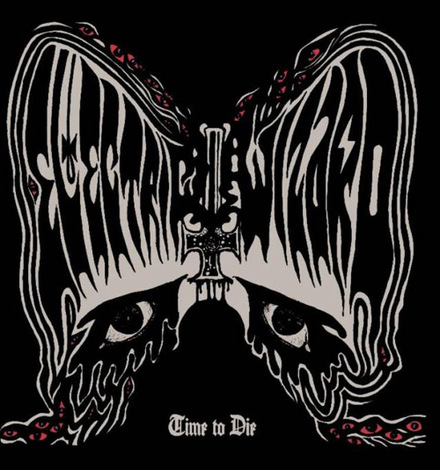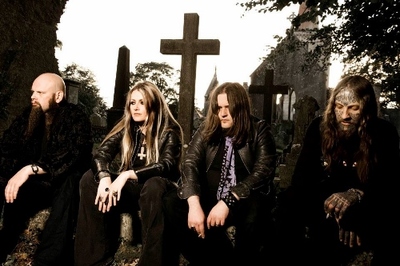Electric Wizard's prodigious new "Time To Die" both carries you and Carries you (Stephen King style) on a Phlegethon of bubbling, churning goo, track blending into track as you slide into a mindless, unsettled underworld. This groaning riff celebration stands with the band's 2000 "Dopethrone" as a classic of English stoner atmospherics, and I plan to test the resolve of any zombie-ghoul-ghost who comes to my door by blaring "Funeral of Your Mind" and "I Am Nothing" all Halloween night.
E.W. guitarist-vocalist Justin Oborn has announced vague plans to tour the USA early next year -- for the first time in about 13 solar cycles, as far as I can discover. It was June 9, 2002, in fact, when I talked to Oborn in his bus outside the Troubadour. The eclectic "Let Us Prey" was then Electric Wizard's current album; they'd invaded Los Angeles less than a year previous, and I told Oborn I'd use the interview tape for a feature when they returned, presumably kinda soon. Arrests, injuries, band fights and label wars followed, and, y'know, tempus fuggit. But today I'm determined to dredge up memories, however deeply buried, of that black spring night.
When I climbed onto the bus, the stocky, unconcerned Oborn was sitting at a little table rolling . . . cigarettes. He switched to rolling joints -- "a primary requirement of the tribulations of the bus" -- halfway through our interview, when a large bag of glistening buds arrived. Bleary-eyed and sipping a canned Budweiser, he mentioned his admiration for tourmates Sourvein, so it's not surprising that within a few years Sourvein guitarist Liz Buckingham would become his songwriting partner, ax foil and wife; her spiteful yowl (reminiscent of L7) adorns "Incense for the Damned," the opening track of "Time To Die." North Carolina's Sourvein and Canada's Sons of Otis were traveling on the same bus.
With the drone music of Earth (Dylan Carlson's band from Olympia, Washington) rumbling on the bus speakers, Oborn introduced himself as "Conjurer From Outer Space."
How do you get your wonderful sounds?
"We play loud, that's the main thing. We play incredibly loud in the studio, and I like the old valve amps. I ain't too fussy about what it is, as long as it gives me volume. Currently I have a Sound City amp, which is what Black Flag uses as well."
You downtune, right?
"To C [and even B-flat, according to this month's Guitar World]. It rings out nice and clear; you get the resonance and sustain."
How did you come up with the idea of making the vocals a background thing?
"I grew up with the English psychedelic scene, like Loop -- especially in the mid-'80s there were a lot of psychedelic bands in England. Singing to me is the Beatles influence, and I'm not into it."
Your motto on "Dopethrone" was "Legalize drugs and murder." Any special inspiration for that?
"Everyone feels like that sometimes."
You don't seem like an especially hostile person.
"Not especially, but you can be pushed."
What does it take?
"A bad bag of weed. And being in the music business."
This bag looks good.
"Forty dollars for a quarter ounce -- we got our money's worth. It's very easy to procure in England. People grow their own weed. They grow it on the roofs of the houses, because there's no sun, so it's good weed. Possession is a class C, so there's nothing they can do unless you're literally caught selling -- there's a microscopic fine for selling more than an ounce; unless you're selling speed or cocaine, you're going to be okay. I got busted a couple of years ago, but I only got a minor fine."
You've had some difficulties lately.
"I had some bad luck for a while -- alcohol, women. I had an accident in a car and had a bit of trouble."
Your music feels right for the times we're in [post-9/11].
"You don't pretend you're gonna 'make it,' so there's no sort of rock-star potential or trying to be commercial."
[Bassist Tim Bagshaw stopped by, wearing a T-shirt with Jesus on it. Justin commented.] "I like to visit churches just for the fun of it. I like organs. The organs kill."
You're from the south of England. What do they produce there?
"Milk. It's a farming area, it's not industrial."
What kind of jobs did you have?
"Regular shit. Printing and packaging."
Are you a reader as well as a printer?
"I'm a big reader, yeah -- old fiction of the '30s and before. H.P. Lovecraft, Robert E. Howard. There was a pretty crazy scene back then -- a lot of people were doing drugs, into weird shit. Lovecraft was always talking about avant-garde artists and art."
How's the tour been going?
"In Montana, the Air Force guys were into us. They were cool. They were helping me to smoke weed, so they killed cops to cane in [English slang for enthusiastic consumption]."
What's your favorite Black Sabbath album?
"'Master of Reality.' It's like a template for heavy metal. Sabbath's jazz background gave them that dark edge, because they were prepared to try new shit. I listen to some jazz. I can listen to any kind of music."
How much of what you do onstage is improvised?
"Fifty percent. If you went to four gigs in a row, you'd notice a big difference."
Do you always keep the air conditioning up so high?
"We like to cool way down before we go out and sweat."
The Troubadour was indeed pretty hot by the time Electric Wizard cranked up. Sound man: "Could you turn the guitar down?" Oborn: "No."
As the riffs and feedback ground forward, I couldn't decide whether young bassist Bagshaw was brilliant or awful, an evaluation made even harder by the spontaneously accented drumming of Mark Greening. (Over time Greening has proved the perfect drummer for Electric Wizard, so his departure this year after the recording of "Time To Die" comes as a disappointment.) Despite the trio's rhythmic bizarritude, though, heads were banging in unison around the room, subliminally tuned in not just to the riffs but to the attitude behind the riffs -- a magical phenomenon.
The band started slow and, contrary to standard practice, got slower, sucking the audience into their sludgy spell as Oborn exuded a strange, detached calm, his guitar so loud and distorted that the overtones built up a parallel sound field reminiscent of one of those cathedral organs he'd been describing. His leads were nonchalant and untechnical. Songs included "Chosen Few," "Dopethrone" and "Priestess of Mars," none sounding much like the album versions.
This had been something -- something more than music. Thinking unfocused thoughts, I walked out onto Santa Monica Boulevard through a row of motorcycles.


